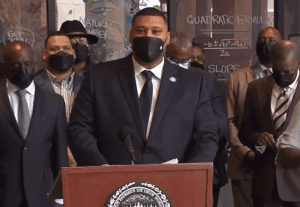Who is a member?
Our members are the local governments of Massachusetts and their elected and appointed leadership.

Frank Farrow, the new executive director of Boston’s Office for Black Male Advancement, speaks during the Feb. 3 event announcing his appointment.
A new office and commission in Boston will address systemic barriers facing the city’s Black men and boys and work to improve their educational, socioeconomic and health outcomes.
Boston’s new Office for Male Black Advancement will work to “empower Black men and boys and ensure they have equitable access to opportunities through the concentration of policy, programs, resources, and local and national partnerships.” A new Black Men and Boys Commission will advise Mayor Michelle Wu and the city on equity issues, programs and budget priorities, and provide outreach to residents.
Surrounded by Black leaders in Boston’s Roxbury neighborhood on Feb. 3, Wu named Frank Farrow as the office’s first executive director. Farrow, a Roxbury native who founded a nonprofit serving Boston youth and families, said he had benefited from different opportunities while growing up. But those resources dwindled as he grew older, he said, and Boston can now give Black boys and men better support.
“We have an opportunity to ensure that Black men and boys in this city realize their full potential, and are able to live in a greater Boston,” Farrow said, “and pass on a legacy of success, prosperity, and uplifting and empowering Black men and boys in our community.”
With the new office and commission, Boston will address the policy and social gaps that worsen outcomes for Black men and boys, Wu said at the event. Incidents of police brutality nationwide and COVID-19’s disportionate health outcomes illustrate the disparities that persist, she said.
“This is the heart of our city, this is the future and the success and the prosperity of Boston connected to each and every one of us,” Wu said. “And so I am proud to stand among many, many city leaders, in that the future of Black men and boys in Boston is the future of Boston.”
The commission has been years in the making. In 2014, the City Council approved then-City Councillor Tito Jackson’s ordinance to create a commission, but then-Mayor Martin Walsh vetoed it. Last year, Councillor Julia Mejia revived the ordinance, which the council approved and Acting Mayor Kim Janey signed.
Mejia, who became a councillor in 2020, told the MMA recently that the commission was an early priority, given the obstacles her constituents were facing.
“Black men in particular, here in the city of Boston, have faced a number of systemic barriers, from those who are returning citizens, to men trying to navigate the economic ladder … as well as issues of mental health and wellness,” Mejia said. “So to be able to establish a commission that will dive deeper into these issues and create a pathway forward was important to me.”
For the 21-person commission, Wu will appoint seven experts on issues facing Boston’s Black men and boys, and seven members who have experience or knowledge of those issues. Wu will choose the final seven from a list of 14 people nominated by the council. The commission will meet monthly, provide quarterly reports to the council, and produce an annual report.
Mejia said she hopes members will be selected in the coming weeks, and be ready to convene by the end of March. In terms of commissioners’ expertise, Mejia said her priorities include mental health and wellness, physical health, and having a commission that represents all experiences, including those of LGBTQ residents. With regard to specific policies or programs, Mejia said she wants Boston’s male Black community to determine what’s most needed.
“I think Boston should be the leader in advancing this work,” Mejia said, “and I think that we have an opportunity to create a blueprint for others to follow.”